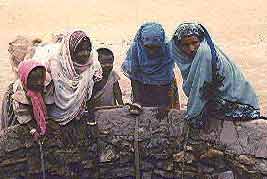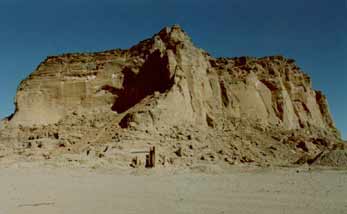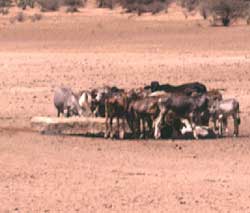


The Masalit of Sudan
The Masalit are a 250,000 strong non-Arab people group living in the most remote and unknown areas of the North African countries of Sudan and Chad. Approximately 140,000 of these live in Sudan, primarily in the west near the border with Chad. The Masalit developed a reputation for being fiercely independent—they had their own language and customs, produced everything they needed to survive and were capable of defending their own borders. In more recent years, however, political, economic and cultural processes have brought them into increasing contact with the outside world.
The Masalit primarily make their living through agriculture.
They produce millet, sorghum, peanuts, okra and various fruits,
among other crops, and also gather useful products, such as honey
and tree gum, in the forests. Most of the grain is used for their
own food, while the other crops are sold for cash. In addition to
farming, they also raise cattle, sheep and goats, which provide
milk for the villagers. The Masalit used to rely on donkeys for  transportation, but camels are becoming increasingly important.
transportation, but camels are becoming increasingly important.
Most of the Masalit live in village settlements composed of several smaller compounds. The compounds are surrounded by fences made from millet stalks, and consist of several huts situated closely together. The round huts have conical thatched roofs, and the walls are made of grass or millet-stalk mats supported by strong wooden posts or poles. Each village has a masik, or central shaded clearing, where men gather to socialize, pray and discuss village matters. The women do not gather in the masik, but socialize at the village well or in each other’s homes.
In Masalit society, men often have two or more wives simultaneously.
The groom must pay a bridewealth consisting of cows and goats and a variable
amount of cash, and must live with his bride on her mother’s compound for
at least the first year of marriage, working in his mother-in-law’s fields.
After the first year, he will work in his own fields, but the couple often
does not move to a new home until at least one child is born. Masalit husbands
and wives are separate economic units, and divorce is common. The man is
expected to provide housing and most cash goods for his family, while women
are responsible for domestic concerns and food for the family, yet each
maintains their own fields and products, and older children often have
their own fields as well.
responsible for domestic concerns and food for the family, yet each
maintains their own fields and products, and older children often have
their own fields as well.
The Masalit practice Islam, and the religion dominates political and social life and values. Many are becoming increasingly orthodox by abstaining from alcohol, praying five times a day and asking for religious advice and instruction in important matters. Many have never heard a clear presentation of the Gospel, not only because of their physical isolation but also because there are no Christian radio or television broadcasts or Bible translations in the Masalit language, and few mission agencies targeting this people group.
As you intercede for this Sudanese people group, remember to:
Pray for a mighty outpouring of God’s Spirit among the Masalit people.
Ask God to create a hunger for the Truth within the hearts of the Masalit people.
Pray that God will speak to the Masalit through dreams, visions or any other method He desires.
Pray for a strong witness and good Christian resources among the Masalit in their own language.
Pray that God will save key Masalit leaders who will boldly declare the Gospel. For more information contact: